
CONGRATULATIONS ON YOUR NEW APPOINTMENT AS GOVERNMENT STATISTICIAN
We in the School of Economics have been overwhelmed with excitement about your new appointment as the Government Statistician. We therefore heartily wish on behalf of the board, management, faculty, staff, students, and alumni of the School of Economics, UCC to extend our warmest congratulations to you on your new position. With your extensive experience, excellent leadership and wisdom demonstrated in your previous positions at the University of Cape Coast, as well as the various recognitions garnered in both Ghana and the International level, we have no doubts at all that you will excel in your new position. We believe this new role affords you the right platform to realize one of your cherished goals of building a big hub of quality data for Ghana.
We wish you every success in your new duties and pledge our continued prayers, support and best wishes. Once again, we reiterate our sincere congratulations and say ‘Ayekoo’ on your appointment!
SGD - Dr. E. Ekow Asmah, Dean, School of Economics, UCC, on Behalf of Board, Management, Staff, Students, and Alumni of School of Economics.

